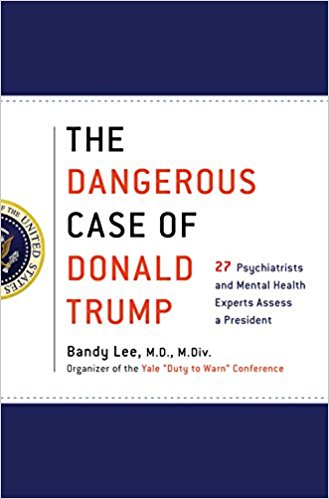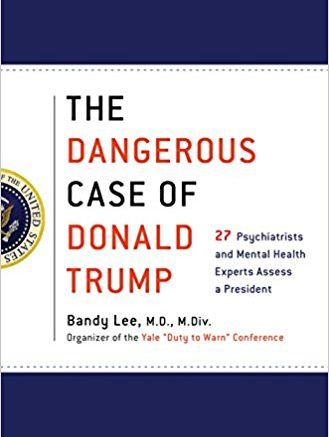
By Chauncey Devega
Salon (9/12/17)
The president of the United States is a global celebrity whose every action is endlessly commented upon and dissected for meaning by the news media, foreign powers (both friends and foes alike) and the public.
In the age of television and now the internet, there are hundreds of thousands of hours of video and audio footage of every president widely available. There are also rumors and leaks from within the White House and other branches of government that can help paint a picture of a given president’s moods, desires, thoughts and other behavior. What is to be done if this evidence collectively suggests that the president of the United States is mentally ill?
Unfortunately, with Donald Trump this is not the stuff of a political thriller. It is painfully plausible and all too real. The evidence suggesting that Donald Trump may have serious mental health problems is overwhelming.
He is a compulsive liar who creates his own fantasy world. Trump is also extremely moody and impulsive. Trump’s advisers have to satisfy his extreme narcissism and nurture his detachment from reality by presenting him — on a twice-daily basis — with a file folder full of “good news.” Fellow Republicans have been recorded on a hot mike suggesting that Trump may be “crazy.” The American news media, as well as commentators from other countries, have voiced serious concerns about Trump’s mental health and the threat it poses to global security.
Why are so many psychiatrists and other clinicians afraid to comment about Donald Trump’s mental health? What is the role of the “Goldwater rule” — which holds that mental health professionals should not attempt to diagnose public figures they have not personally treated — in their relative silence? Is Donald Trump suffering from symptoms of mental illness? If so, what type of disorder does he exhibit, and what are the consequences for America and the world?
In an effort to answer these questions, I recently spoke with Dr. Lance Dodes. He is assistant clinical professor of psychiatry at Harvard Medical School (retired) and a training and supervising analyst emeritus at the Boston Psychoanalytic Society and Institute.
Dodes is a signatory to the much-discussed February 2017 open letter to The New York Times that sought to warn the public about the dangers posed by Donald Trump’s mental health. He is also a contributing writer for the new book “The Dangerous Case of Donald Trump: 27 Psychiatrists and Mental Health Experts Assess a President.”
A longer version of this conversation can be heard on my podcast, which is available on Salon’s Featured Audio page. …
*****
The Dangerous Case Of Donald Trump: Psychiatrist Robert Jay Lifton & Bill Moyers On “A Duty to Warn”
By Bill Moyers
Moyers & Company (9/14/17)
There will not be a book published this fall more urgent, important, or controversial than The Dangerous Case of Donald Trump, the work of 27 psychiatrists, psychologists and mental health experts to assess President Trump’s mental health. They had come together last March at a conference at Yale University to wrestle with two questions. One was on countless minds across the country: “What’s wrong with him?” The second was directed to their own code of ethics: “Does Professional Responsibility Include a Duty to Warn” if they conclude the president to be dangerously unfit?
“He is stimulating feelings that are potential and latent in our society, but very real, and rendering them more active and more dangerous. And in that way, he’s having a very harmful effect that I think mounts every single day.” – Robert Jay Lifton
As mental health professionals, these men and women respect the long-standing “Goldwater rule” which inhibits them from diagnosing public figures whom they have not personally examined. At the same time, as explained by Dr. Bandy X Lee, who teaches law and psychiatry at Yale School of Medicine, the rule does not have a countervailing rule that directs what to do when the risk of harm from remaining silent outweighs the damage that could result from speaking about a public figure — “which in this case, could even be the greatest possible harm.” It is an old and difficult moral issue that requires a great exertion of conscience. Their decision: “We respect the rule, we deem it subordinate to the single most important principle that guides our professional conduct: that we hold our responsibility to human life and well-being as paramount.”
Hence, this profound, illuminating and discomforting book undertaken as “a duty to warn.”
The foreword is by one of America’s leading psychohistorians, Robert Jay Lifton. He is renowned for his studies of people under stress — for books such as Death in Life: Survivors of Hiroshima (1967), Home from the War: Vietnam Veterans — Neither Victims nor Executioners (1973), and The Nazi Doctors: Medical Killing and the Psychology of Genocide(1986). The Nazi Doctors was the first in-depth study of how medical professionals rationalized their participation in the Holocaust, from the early stages of the Hitler’s euthanasia project to extermination camps.
The Dangerous Case of Donald Trump will be published Oct. 3 by St. Martin’s Press.
Here is my interview with Robert Jay Lifton …
- Letter To The NY Times – Two Psychiatrists Write: ‘Protect Us From This Dangerous President’ – Soon after the election, one of us raised concerns about Donald Trump’s fitness for office, based on the alarming symptoms of mental instability he had shown during his campaign. Since then, this concern has grown. Even within the space of a few weeks, the demands of the presidency have magnified his erratic patterns of behavior. In particular, we are struck by his repeated failure to distinguish between reality and fantasy, and his outbursts of rage when his fantasies are contradicted. Without any demonstrable evidence, he repeatedly resorts to paranoid claims of conspiracy. … Read the Rest

